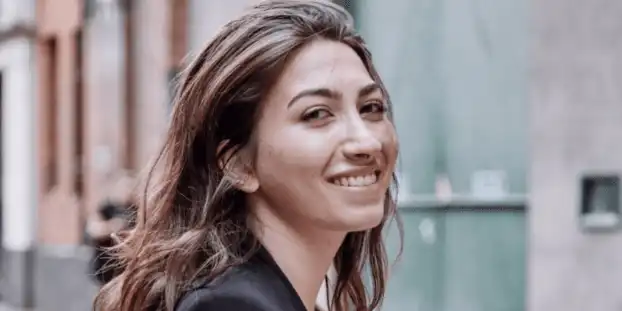Home>"When I was in Ukraine, there were things I could not film, but could write about"
27.06.2022
"When I was in Ukraine, there were things I could not film, but could write about"
Astrig Agopian, graduate from the Joint Master Journalism and International Affairs.
May you describe your academic and professional background?
I spent five years at Sciences Po — two for the Euro-American bachelor program in Reims followed by a year-long exchange program at the Missouri School of Journalism and two years in Paris in the joint Journalism School / PSIA masters degree, focusing on international security and the FSU area. I graduated in 2020 during the Covid pandemic. I worked as a video journalist at LCI for the summer, and then worked as a reporter and camerawoman at France 3 in Picardie. In 2021, I moved to Armenia and freelanced for a year. I filmed, wrote, for many different media including AFP, RTS, Euronews, La Croix, The Guardian and others. That same year, I won the Google News Fellowship and a contract with AFP’s fact-checking team for two months. In January 2022 I moved back to Paris, and started freelancing from there.
What is your job title today? How is your daily routine?
I am now a freelancer based in Paris, but I travel a lot for commissions, mainly in Eastern Europe, the Caucasus and Mediterranean countries. I work for France Télévisions when I am in France, and I freelance for various French-speaking and English-speaking media when I am abroad (RTS, La Tribune de Genève, le Journal du Dimanche, On Spec podcast and others). It’s hard to define my daily routine because it really varies depending on where I am. When I am in Paris, I work for the show ‘Vrai ou Fake’ on France Info, which means I go to the office, research relevant topics to fact-check and report on, edit and voice packages, go live to do explainers etc. When I am abroad, every day is different.
Recently, I was in Ukraine covering the war, so there was no routine. There were some things I could not film, but could write about. Every day I had to reassess the risks, discuss with my different editors, and work as much as possible to show the reality on the ground. As a freelancer, another side of my reality is that I have to spend many hours on paperwork, reminding employers to pay me, and other unpleasant things.
What were the main takeaways from your degree?
What I really liked about the Joint Master Journalism and International Affairs degree was that it combined practical journalism skills and analytical training. Practically speaking, I learned how to report and use a camera during my Master’s degree and those skills were immediately put to the test with my first job as a video journalist. I focused on defence and security in the Former Soviet Union area at PSIA, which means I studied the «frozen» conflict in Nagorno-Karabakh and the war in Ukraine, in the Donbas region. I never expected I would have to cover the full-scale awakening of those wars in the first years of my career. But it happened, and the theoretical knowledge and analytical skills I had learned were extremely useful when I was reporting on the ground. My degree gave me useful tools to be efficient and professional in those circumstances. That being said, in journalism you keep on learning every single day, on the job.
What memories did you keep from your school, your cohort, your teachers?
I met people who became very close friends at school, and I am very grateful for that. We had a very interesting international and diverse cohort. I remember that the program was very intense — a good insight into the media industry. Having teachers who work as journalists was also very helpful. When I started freelancing, I contacted several of my former teachers and they put in touch with alumni of the program. Those connections were useful to find assignments.
What advice could you give to a student who would like to become a journalist?
Experience is crucial. If you want to become a journalist, start reporting wherever you are and with whatever means you have. It can be writing for your high school newspaper, interning at your local radio station, finding a story and interviewing your family members or friends. The best way to prove to any future potential employer or teacher that you deserve a chance, is to show them your clips. Another advice would to be to watch, read and listen to as many reports as possible. So many things are easily accessible with internet, enjoy it, it will help you improve.
